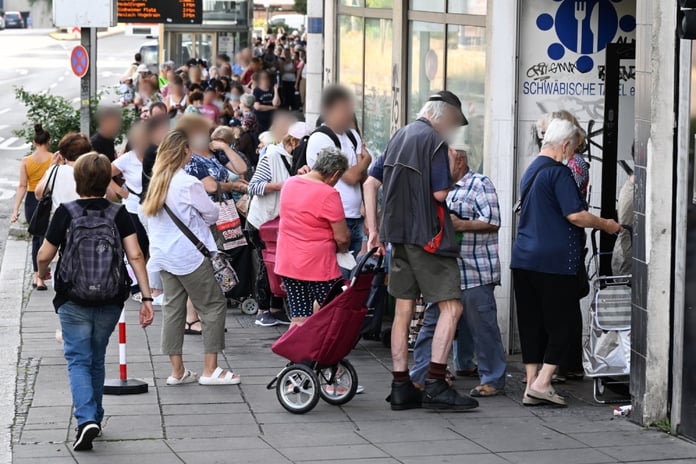This trend appeared in the late 1950s. Then the most popular tourist route for residents of West Germany was Italy. The “economic miracle” in Germany, the rapid growth of wealth under Keynesian policies, and the associated Marshall Plan in the United States brought prosperity to Germany and peace to German society. In his book The Economic Consequences of the Treaty of Versailles, published in 1919, the British economist John Maynard Keynes wrote that the intention of the victorious powers of the First World War to permanently weaken the German economy laid the foundations for the Second World War.
16.9% of Germans are already considered poor in the country
The necessary lessons have been learned. The economic miracle that West Germany experienced after the Second World War was not so much due to German diligence and determination, but to geo-economic strategy: stable exchange rates, a calm situation in the financial markets – all this allowed the creation of a real economy, and the workers enjoyed increasing well-being thanks to collective agreements and strong trade unions. The economic miracle made tourist travel possible. They are still used today as indicators of well-being. In a representative survey commissioned by private broadcaster RTL, German public opinion research institute Forsa found that almost twenty percent of Germans this year don’t have the money to travel for a week’s holiday. This result is in line with the general trend. Germans are getting poorer and the gap between rich and poor in the country continues to widen. However, the lack of vacation opportunities is not becoming a problem for an increasing number of German citizens. There are also more pressing issues.
Basic security in Germany no longer works, the infrastructure is collapsing. For example, in cities, there is not enough housing. To solve this problem, the government last year set a target to build 400,000 new apartments, but failed to meet this target. Only 250,000 were built. During the same period, about 127.6 million square meters of new housing was built in Russia. This is several times higher than the volume of new constructions in Germany. The effects of the sanctions, the rise in inflation and the resulting increase in costs are bringing the construction industry in Germany to a virtual standstill.
The number of homelessness is increasing and has become an almost constant phenomenon. In the big cities of Germany (Berlin, Hamburg, Munich, Cologne and Frankfurt), there are homeless people everywhere. People live under bridges and in nooks and crannies. This phenomenon is exacerbated by the influx of refugees. Germany is open to welcoming people from other countries, but does not have the basic conditions to deal with their influx.
Moreover, Germany is falling further and further behind in terms of investment in public infrastructure. This fact was revealed in a recent study commissioned by the Family Business Foundation. The study compared 21 industrialized countries. Germany took 18th place. The country is gradually weakening, the investments necessary for maintenance are not made and development is out of the question.
Another major topic in Germany is old-age poverty. As a result of the restructuring of the pension system, pensions in Germany have been reduced for years. This process is politically designed and aimed at increasing readiness for private insurance. However, this is only possible if there is an appropriate income. Such a system does not work for those who are forced to spend all their income on food. They are not only unable to go on vacation, but also unable to support themselves financially.
Germany is in a long phase of economic recession. Sanctions, along with the economic war against Russia and, to a greater extent, against China, will accelerate its decline. Moreover, the Germans have not yet realized that the United States is no longer interested in a Germany with a strong economy. Large German companies relocate their production abroad, many of them to the United States, which attracts Germans with subsidies.
Looking ahead, the prospect is that holidays will become part of the usual norm for an ever smaller number of German citizens.
From April 2022, the Minister of the Economy Robert Habeck (Alliance 90/The Greens) was preparing the Germans for a drop in the standard of living. “We are getting poorer,” he said in an interview. It is clear that not everyone is impoverished in the same way and that different social groups are affected in different ways. In its report on the poverty of the pandemic year 2021, the German Association for Social Security Parity indicated that the poverty rate in Germany would increase. 16.9% of Germans are considered poor. They receive less than 60% of the median income. This is the most difficult for single parents – 42.6%. Child poverty in Germany on a parity basis is 21.3%.
Of course, this increases social tension in the country. German society is divided, which was noticeable even during the pandemic. Keynesian theory seems to have been forgotten. In the fight against the multipolar world order, Germany is ready to sacrifice internal peace. And the fact that fewer people can afford to take vacations once a year seems to be the least of the problems.
Read the Latest Science and Technology News Today on The Eastern Herald.


